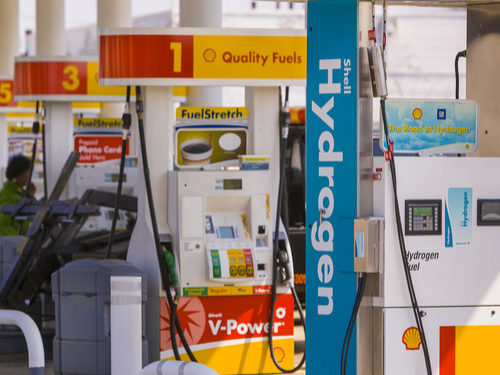
Visit Our Sponsors |
|
|
|
|
|
|
|
|
|
|
|
|
|
|
|
|
|
|
|
|
|
|
|
|
|
|
|
|
|
|
|
|
|
|
|
|
|
|
|
|
|
|
|
|
|
|
|

His vision to make China an electric-vehicle powerhouse revolutionized the global auto industry, cementing a move away from the combustion engine. Now, Wan Gang says get ready for the next game-changing moment.
The world’s biggest car market is set to embrace hydrogen fuel-cell vehicles the way it did EVs, Wan, who’s been called the father of China’s electric-car movement, said in a rare interview in Beijing on June 9.
A former Audi executive who went on to become China’s science-and-technology minister, Wan convinced leaders two decades ago to bet on the then-untested technology of vehicle electrification, selling it not only as a way to boost economic growth but also to tackle China’s dependence on oil imports and its mounting levels of pollution. His strategy — using government subsidies to bring carmakers and drivers on board — made China home to one of every two EVs sold globally today.
And now it’s hydrogen’s turn, Wan said.
“We should look into establishing a hydrogen society,” said Wan, 66, who’s now a vice chairman of China’s national advisory body for policy making, a role that ranks higher than a minister and gives him a voice in the nation’s future planning. “We need to move further toward fuel cells.”
That means the government will commit resources to developing such vehicles, he said. While China plans to phase out the long-time subsidy program for the maturing EV industry next year, government funding for fuel-cell vehicles may stay in place to some extent, Wan said.
Shares of some hydrogen-related companies rose. Jiangsu Huachang Chemical Co., which develops hydrogen pumping stations, advanced by the 10-percent daily limit on Thursday in Shenzhen. Shanghai Tongji Science & Technology Industrial Co. and Lanzhou Great Wall Electrical Co., which are both invested in the fuel-cell vehicle industry, also rose in Shanghai.
But China has the muscle to change all that should it make hydrogen-powered vehicles a national priority — the type of turning point the industry has been waiting decades for.
For Wan — a mechanical engineer trained in Germany — the shift toward hydrogen is a natural step in realizing a vision of having electric cars dominate inner-city traffic, while buses and trucks filled with hydrogen tanks roam the nation’s highways for long-distance travel.
The adoption of fuel-cell vehicles has been slow in spite of China having an abundant supply of hydrogen, Wan said. There are only about 1,500 such vehicles in use there today, compared with more than 2 million purely electric vehicles, he said.
It’s not just China. Hydrogen fuel cells have struggled to gain traction worldwide not just because of high costs — one of the key components is platinum — but also because of the lack of infrastructure and the complexity of storing hydrogen.
Then there’s the matter of hydrogen’s flammability, as evidenced by the recent fire at a refueling station in Norway.
“We will sort out the factors that have been hindering the development of fuel-cell vehicles,” Wan said.
Efforts are under way in Japan, which plans to increase the number of fuel-cell vehicles on its roads to 40,000 by 2020 — though BloombergNEF estimates sales so far aren’t close to that target. In Europe, Daimler AG’s Mercedes-Benz unit rolled out a fuel-cell version of its popular GLC SUV. In the U.S., the California Fuel Cell Partnership is trying to promote the technology, with limited success.
Back in China, buses appear to be particularly ripe for fuel cells, which use a chemical process to convert hydrogen into electricity, emitting only water vapor. China is by far the world leader in using electric buses — accounting for 99 percent of them worldwide last year, according to researcher BNEF — but they’re mostly used in cities for short distances.
Hydrogen buses are capable of driving beyond 500 kilometers (310 miles) on a full tank, versus about 200 kilometers for electric ones. That presents a big opportunity because there are five long-distance buses in China for every inner-city one, according to Wan.
China is promoting the adoption of hydrogen vehicles in selected trial regions as it sets up an ecosystem that includes hydrogen production, storage, transportation and refueling, Wan said. Long-range commercial vehicles aren’t currently well-suited to run on batteries alone because of weight and range constraints, according to a BNEF report last month. Fuel cells would be a good bet should the government ease restrictions on hydrogen-refueling infrastructure.
Beyond hydrogen, Wan voiced skepticism about the notion that computers will completely replace the need for humans in the driver’s seat.
“I believe that people still want to drive or have a sense of control,” Wan said.
He also said he doesn’t envision China issuing a national ban on the sale of gasoline cars as provincial authorities will be left to make their own decisions. The current dual-credit system, which resembles the cap-and-trade systems being deployed worldwide for carbon emissions, will continue, but it will gradually be converted to a carbon trading system, he said.
China requires all carmakers to meet minimum requirements for producing new-energy vehicles, including fuel-cell autos. Carmakers that don’t meet the quota can buy credits from rivals that exceed it.
“We have a responsibility to reduce emissions,” Wan said.
RELATED CONTENT
RELATED VIDEOS
Timely, incisive articles delivered directly to your inbox.






